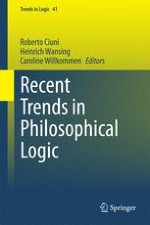2014 | OriginalPaper | Chapter
The Knowability Paradox in the Light of a Logic for Pragmatics
Authors : Massimiliano Carrara, Daniele Chiffi
Published in: Recent Trends in Philosophical Logic
Publisher: Springer International Publishing
Activate our intelligent search to find suitable subject content or patents.
Select sections of text to find matching patents with Artificial Intelligence. powered by
Select sections of text to find additional relevant content using AI-assisted search. powered by
